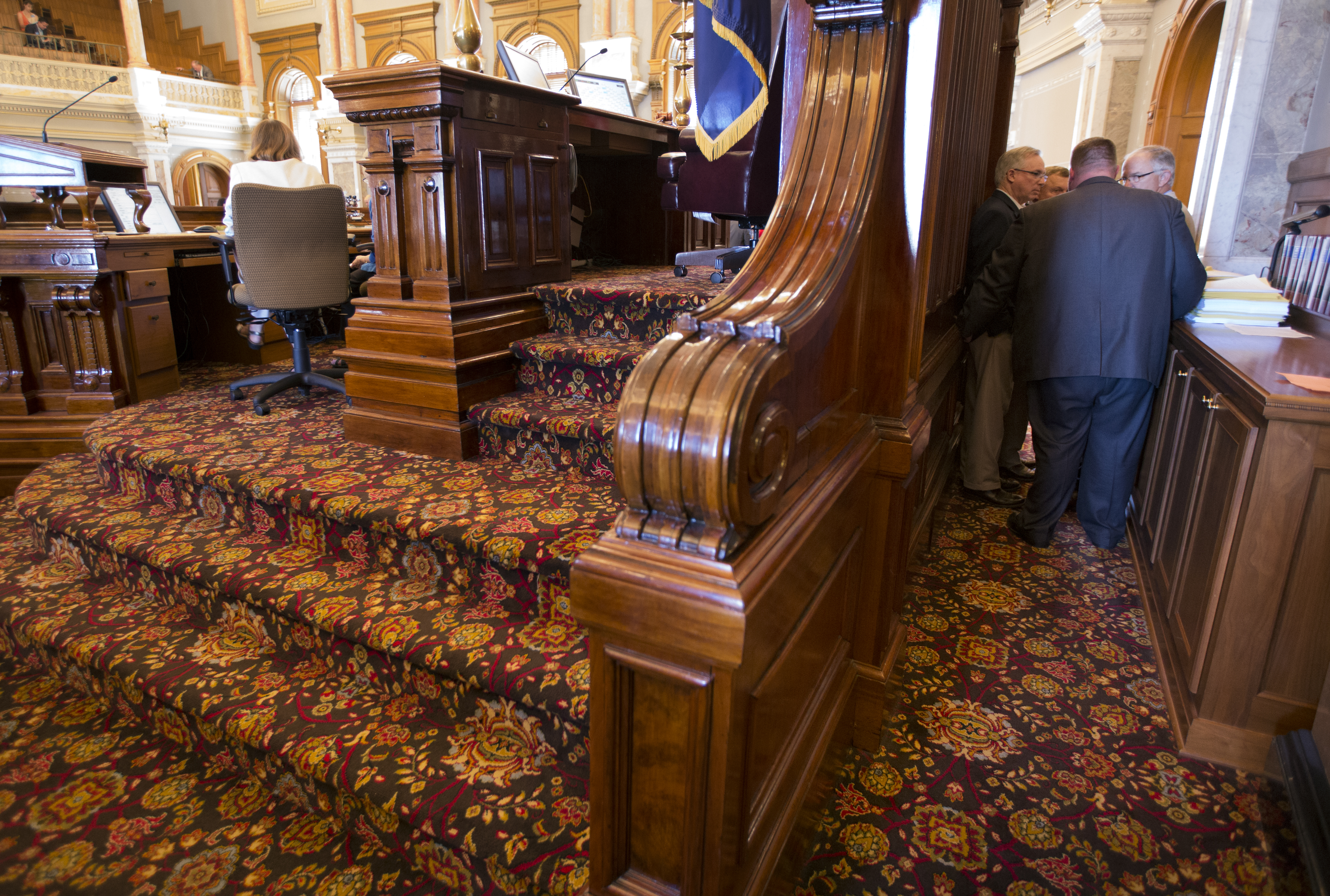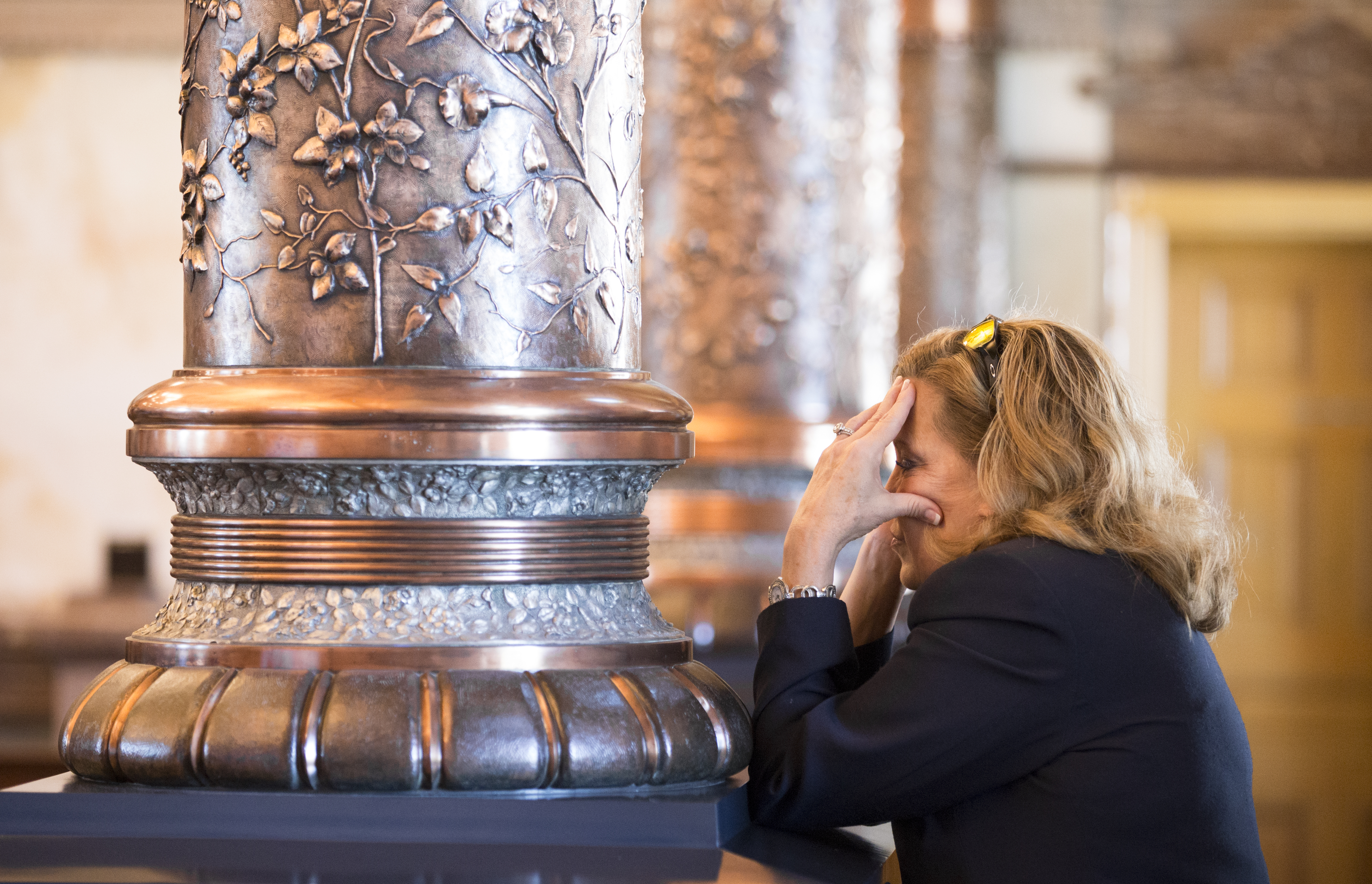Lawrence schools would lose $3.8 million, KU $15 million, under Brownback cuts

A handful of Republican lawmakers huddle up behind the dais in the House chamber after recess was called on Tuesday, June 9, 2015 during the 110th day of the legislative session in Topeka. Legislators are in the process of trying to pass a tax bill to end the session.
Topeka ? Doubts grew among Kansas legislators Tuesday about whether they can approve tax increases necessary to balance the state budget without deep spending cuts that could lead to more-crowded classrooms and even layoffs of prison guards. Such cuts would cost Lawrence schools more than $3.8 million and Kansas University about $15 million, according to officials with those institutions.

Senator Vicki Schmidt, R-Topeka, puts her head in her hands as she talks on her cell phone following the Senate's morning recess on Tuesday, June 9, 2015 during the 110th day of the legislative session.
Three Senate and three House negotiators Tuesday canceled a second consecutive day of public talks on tax issues. The Republican-dominated Senate approved a bill Sunday that would raise sales and cigarette taxes to help raise $423 million during the fiscal year beginning July 1, but members of the GOP-controlled House doubt it can pass their chamber.
“I hope we get something done, but I’m losing hope,” said Republican Sen. Les Donovan, of Wichita, his chamber’s lead negotiator on tax issues. The continuing stalemate sent the current legislative session into a record 111th day Wednesday.
The state’s budget problems arose after legislators slashed income taxes at Republican Gov. Sam Brownback’s urging in what he described as a nationally watched experiment in stimulating economic growth. He and many Republican legislators want to preserve those tax policies as much as possible, but they have shown no appetite for cutting spending enough to avoid raising taxes.
Legislators have approved a budget, but it doesn’t balance. Because the Kansas Constitution requires a balanced budget, Brownback’s budget director has told lawmakers that if they don’t pass tax increases, the governor’s most likely response would be to cut $400 million from the spending blueprint.
“I feel like we are between a rock and a hard place,” Lawrence superintendent Rick Doll told the Journal-World on Tuesday evening. His district would lose more than $3.8 million under across-the-board cuts, according to information from the Kansas State Department of Education.
“I think the Senate tax bill is a bad bill because it is balancing the budget on the backs of working people,” Doll said. “But the allotment cuts will force us back to a budget cut discussion. We have been able to protect classrooms to this point, but that would not be possible under allotment cuts.”
Doll noted that the $3.8 million would be in addition to the $1.2 million cut the district took when lawmakers approved the new block grant funding formula earlier this year.
Kansas University spokesman Tim Caboni said KU would lose a total of $15 million if state legislators do not increase taxes to close the budget shortfall.
Caboni said KU’s Lawrence campus would lose $8.3 million and its Medical Center in Kansas City, Kan., would lose $6.7 million. The Kansas Board of Regents said the state’s higher education system would lose $48 million.
Regents spokeswoman Breeze Richardson said Tuesday that the board and universities face difficult conversations about priorities if the cuts occur.
At the Statehouse on Tuesday night, Rep. Gene Suellentrop, of Wichita, said fellow House Republicans were negotiating in private over a new tax plan to present to the negotiators.
“There’ll be nothing until we can come together with an understanding on the House side,” he said. “Otherwise it’s just an exercise in futility.”
But Senate Majority Leader Terry Bruce said he doubts his chamber can pass another plan.
“The tax package we approved the other night is about as good as it gets for our members,” said Bruce, a Nickerson Republican.
Budget Director Shawn Sullivan on Monday night told a group of House Republicans that if lawmakers can’t pass a tax bill, Brownback is most likely to impose an across-the-board cut of 6.2 percent in what the Legislature has budgeted for the next fiscal year.
He said public schools would lose $197 million in aid, and a Kansas Association of School Boards lobbyist said that would likely force schools to increase class sizes. Sullivan also said state prisons could be forced to cut “front-line staffing.”
Some legislators viewed his comments as an attempt to push the House into passing the tax bill approved by the Senate. Sullivan said he was asked to answer questions about the consequences of not passing a tax bill.
Republican legislators are divided over how much to increase the state’s 6.15 percent sales tax and how much to raise taxes for more than 330,000 business owners and farmers who stopped paying income taxes on their profits under a 2012 policy championed by Brownback.
The bill approved by the Senate would increase the sales tax to 6.55 percent. It also would drop the rate on food to 4.95 percent, but not until July 2016. It would increase the cigarette tax by 50 cents a pack, to $1.29, and increase taxes on business owners by $24 million during the next fiscal year.
Brownback has promised to veto any plan raising taxes on business owners by more than $24 million, but some House Republicans want to defy him and raise as much as $101 million.







